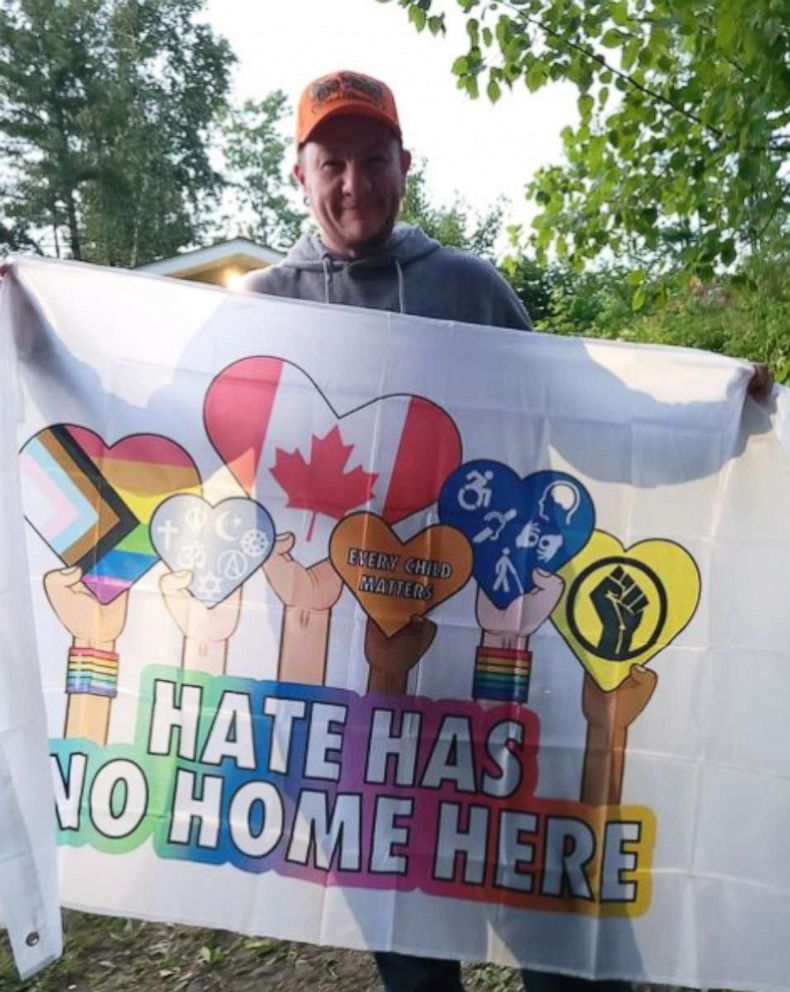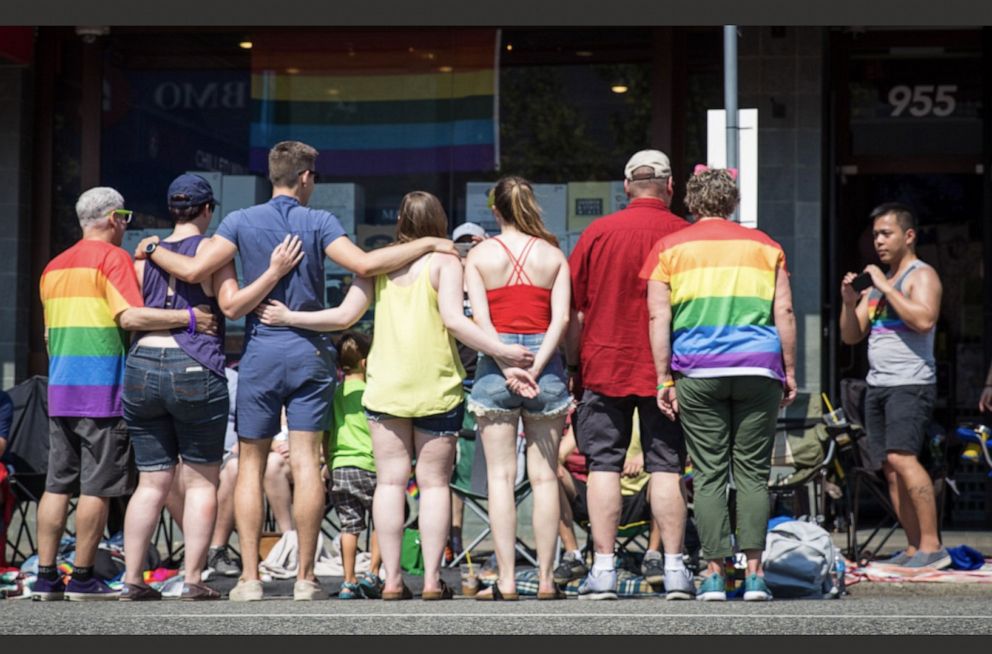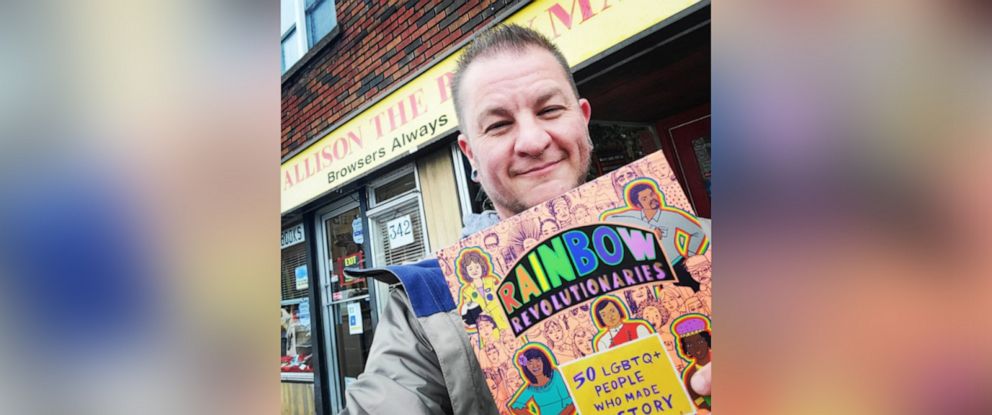Tech companies need to do more to protect LGBTQ users online, GLAAD report says
Advocates say social media can be a tool, and a danger, for LGBTQ communities.
Seth Compton, the founder of the LGBTQ youth group OutLoud North Bay, said he's been waking up to thousands of hateful messages on his social media accounts for the last week after a flyer for the group's youth drag show was shared on TikTok.
"A TikTok account in the States got a hold of the poster and shared it to every sort of outlet they had access to," he said. "All of my social media platforms were completely raided with very hateful and derogatory comments geared to the drag show."
Now, both staff and youth group members of the Ontario community center and 2SLGBTQA+ youth hangout say they have become the target of harassment and threats.
"I've cried a few times because some of these kids are being bullied online," he said. "My wife's been crying for days because she doesn't want me to leave the house."
LGBTQ media advocacy organization GLAAD’s 2022 Social Media Safety Index claims that some of the largest social media platforms are failing to protect LGBTQ users like Compton.

Facebook, Instagram, Twitter, YouTube and TikTok scored poorly on the group's scorecard with 12 LGBTQ-specific indicators of online safety in regard to privacy, expression, and explicit protections. All of the sites scored less than 50% out of 100%, with TikTok being the lowest at 43%.
Activists say the LGBTQ community has become the target of attacks across the board. In the U.S., hundreds of Republican-led bills have been introduced, banning gender-affirming care for trans youth, banning trans women from sports, restricting LGBTQ content in schools and more.
As anti-LGBTQ legislation and rhetoric continue to impact the queer community, Compton emphasizes the importance of safe spaces like OutLoud North Bay.
"This space exists because we need it," Compton said, adding that the messages have affected him, his family and the youth that OutLoud serves.
According to the Centers for Disease Control and Prevention, lesbian, gay, and bisexual adolescents are four times more likely to commit suicide than their heterosexual peers.
While the CDC says connectedness has a mitigating effect on health risk behaviors, Compton and Tyler Boyce, the executive director of the LGBTQ and two-spirit advocacy group the Enchanté Network, worry about the dangers that social media platforms may introduce despite the connection they afford.
"There's so much good that can be generated from this new level of connection, but there's so much violence that can also be caused from this new level of connection," Boyce added.
ABC News reached out to the named companies for comment.

Meta, a technology conglomerate that includes Facebook and Instagram, said they work to maintain a safe platform with user control in mind, citing Facebook's LGBTQ Safety page as a resource for users seeking support.
"We prohibit violent or dehumanizing content directed against people who identify as LGBTQ+ and remove claims about someone's gender identity upon their request. We also work closely with our partners in the civil rights community to identify additional measures we can implement through our products and policies," a spokesperson said in a statement.
Facebook received a 46% score on the index; Instagram scored slightly higher with a 48%.
Twitter, which scored a 45%, said it recognizes the negative impact of online abuse for disproportionality targeted groups and is committed to combating it.
"At Twitter we know the public conversation only reaches its full potential when every community feels safe and comfortable participating. We welcome GLAAD's feedback and the opportunity to better understand the experiences and needs of the LGBTQ+ communities on our service," a Twitter spokesperson said.
TikTok, the lowest scoring of the five major platforms, said the company is now testing new ways for users to flag, filter, and reconsider inappropriate comments before and after posting in an effort to support a safe, inclusive environment on the app.
"TikTok is committed to supporting and uplifting LGBTQ+ voices, and we work hard to create an inclusive environment for LGBTQ+ people to thrive. We're focused on seeing that our policies and practices are fair and equitable, and we continually take steps to strengthen our protections for marginalized people and communities," a spokesperson stated.
Google, which owns YouTube, has not yet respond to ABC News' request.
GLAAD's report pinpoints key concerns including a lack of pronoun fields, transparency of user control and company use of data, and policies on targeted deadnaming and misgendering, along with recommendations on how to enforce existing policies and implement new practices to ensure a safer, more secure experience for LGBTQ+ users.

Sarah Kate Ellis, GLAAD's president and CEO, told ABC News that social media platforms are especially important for people of marginalized groups who might not have access to suitable, real in-person spaces.
"There still remains great community on these platforms, but there is an urgency that falls onto the shoulders of the social media platforms to fix their spaces so that they can be safe," Ellis said.
Ellis said change will require a "three-pronged approach" with companies taking accountability, the government stepping in with regulation and policy that protects marginalized communities and voices, and advocacy organizations working to promote it all.
"Companies are forced to absorb the costs of creating safe products. And what's happening with social media is that they are not absorbing those costs and we are absorbing those costs as a society in the impact on our public safety," Jenni Olson, GLAAD's Senior Director of Social Media Safety added. "LGBTQ people are under attack. We're experiencing that. But it impacts all of us in the same way that other forms of hate impact all of us."




